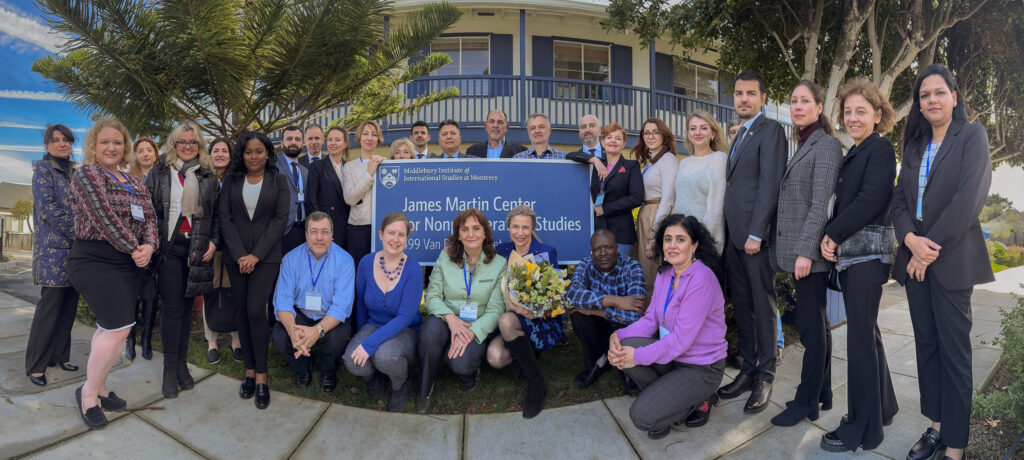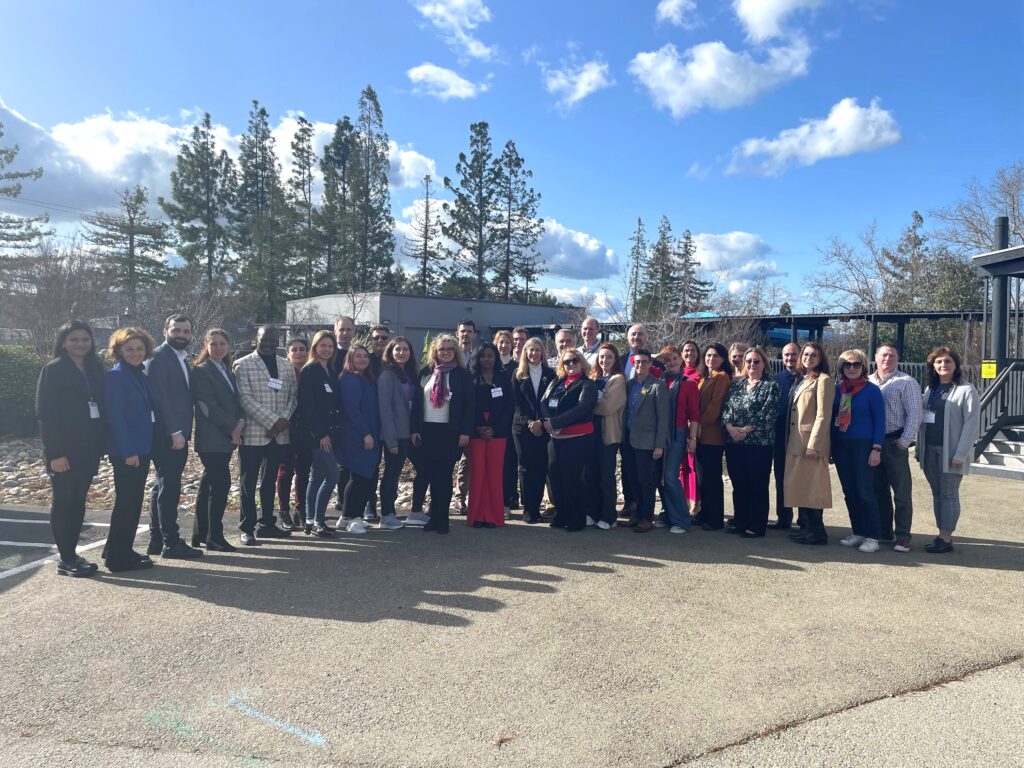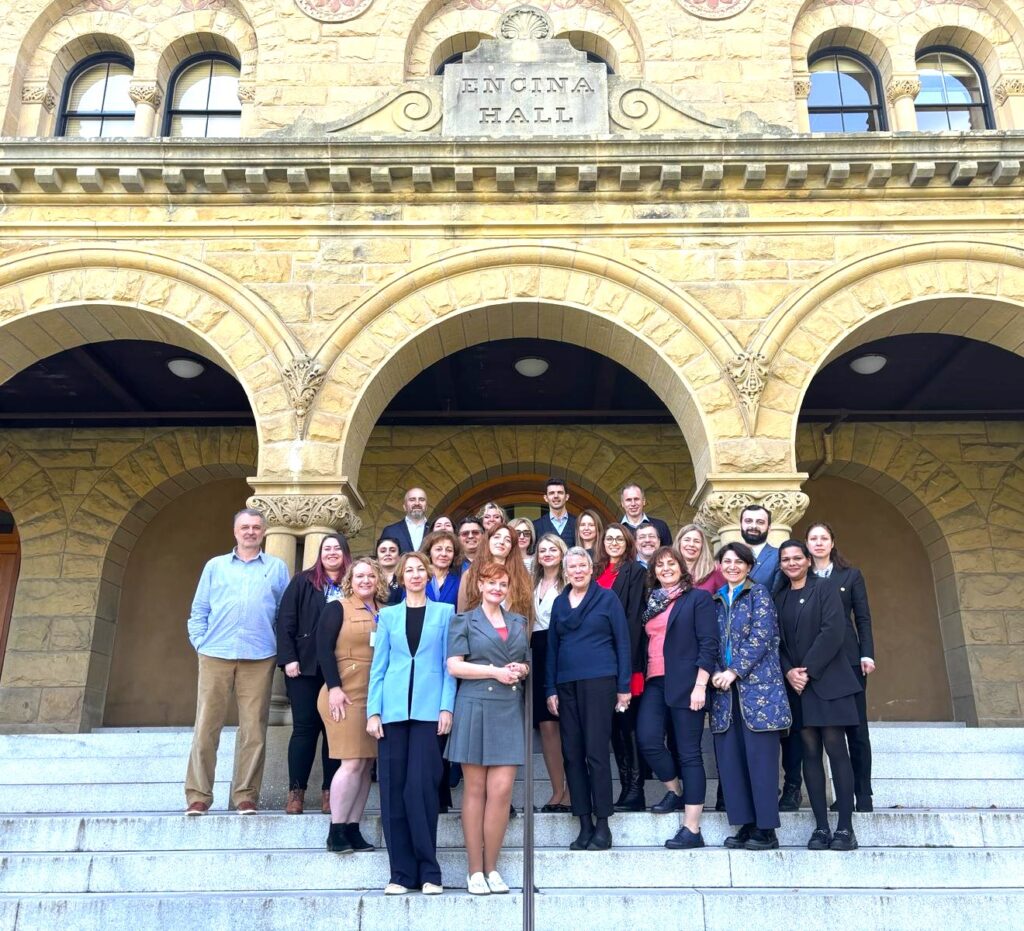March 26, 2024
Margarita Kalinina-Pohl (CNS) and Jennie Gromoll (ISN Bureau, U.S. Department of State)
From March 4-8, 2024, the U.S.-Black Sea Nonproliferation Professionals Exchange group, comprised of 20 nonproliferation mid-senior career experts from Georgia, Moldova, Romania, Türkiye, Ukraine, and the United States convened for its fourth meeting – this time at CNS headquarters. The U.S.-Black Sea Exchange was spearheaded in 2021 by CNS with support from the International Security and Nonproliferation Bureau of the U.S. Department of State. Prior to Monterey, the group has convened in Vienna, the United States, and the Republic of Georgia. The group assembles to share national and regional perspectives on hybrid threats that their individual countries and the region face and to develop needed actions related to nonproliferation, regional and international security.
Dubbed the Monterey Module, this spring’s program gathered an influential, multidisciplinary, and multigenerational group, comprised of prominent scholars and researchers from regional think tanks and academic institutions, such as the Odesa Nonproliferation Center (OdCNP, Ukraine), Civil Council on Defense and Security (CCDS, Georgia), Georgian Center for Strategy and Development (GCSD), Igor Sikorsky Kyiv Polytechnic Institute, Istanbul Technical University, and Hacettepe University (Türkiye). The practitioner’s group included the head of the Agency for Regulation of Nuclear and Radiological Activities of the Republic of Moldova and the National Center for Disease Control and Public Health of the Republic of Georgia. The diplomatic cohort was represented by diplomats from Romania based in Vienna and Brussels, Moldova’s Ministry of Foreign Affairs in Chisinau, the Ukrainian Consulate General in San Francisco, and the U.S. Department of State. For the first time, the group also welcomed a Black Sea regional representative from the United Nations Office on Drugs and Crime. Current CNS Visiting Fellows from Belize, Germany, Georgia, Kenya, and Ukraine also joined as observers.
The program commenced with remarks by the Consul General of Ukraine in San Francisco, Mr. Dmytro Kushneruk, who recognized the importance of the “Exchange” initiative and expressed his appreciation for the opportunity to speak with a group that understands firsthand the existential threats that Ukraine is facing today.
As previously, this Module was a fusion of activities, presentations, brainstorming sessions, and visits, enhancing ongoing connections between U.S. and Black Sea counterparts. It included discussions with CNS and Naval Post-Graduate School professors on the following topics: Black Sea regional threats stemming from the ongoing war in Ukraine and the impact on the nonproliferation regime; Russia’s disinformation campaign in Georgia, particularly surrounding its biological laboratory; security threats and challenges in Moldova and Transnistria; and other threats that linger in the volatile Black Sea regional landscape. CNS experts briefed the group on the implications of generative AI tools for the design of novel bioweapons, open-source intelligence gathering and novel uses of science and technology to counter proliferation threats, and U.S. history and policymaking. The program also featured a presentation of the new book “Russia’s War on Ukraine: The Implications for the Global Nuclear Order” by Ukrainian authors and former CNS fellows Dr. Polina Sinovets, Dr. Iryna Maksymenko, Dr. Valeriia Gergiieva, Dr. Tetyana Melnyk, and Ms. Valeriia Hesse, all of whom are current OdCNP scholars and affiliates. MIIS alumna, Dr. Şebnem Udum, delivered a briefing on Turkish approaches to nuclear security.
The group also visited the Lawrence Livermore National Laboratory (LLNL) where the LLNL Nuclear Threat Reduction Program team presented their work on nuclear threat reduction, nuclear forensics, nuclear emergency support, and arms control verification. LLNL presentations and well-crafted questions from the group led to new insights, generated a lively discussion, and promoted the comprehensive exploration of the subject matters presented during the briefings. The group also enjoyed a tour of the LLNL Discovery Center.
The program culminated with a memorable celebration of International Women’s Day at Stanford University with Rose Gottemoeller, former Deputy Secretary General of NATO and Under-Secretary of State for Arms Control and International Security. Currently a Lecturer at Stanford University’s Freeman Spogli Institute for International Studies and a Research Fellow at the Hoover Institute, Gottemoeller hosted the Exchange group at the Center for International Security and Cooperation (CISAC). Participants had a unique and unparallelled opportunity to hear her views on regional and global challenges and introduce themselves (many participants also shared stories of earlier interactions). The meeting included a shorter presentation of the book about Russia’s war on Ukraine to students from the Center for Russian, East European and Eurasian Studies (CREEES).
This module, as others, aimed to ensure that mid-senior level Black Sea and US experts from across Chemical, Biological, Radiological and Nuclear (CBRN) professions continued their ongoing knowledge-sharing on critical issues of international, regional, and national security by engaging in presentations and discussions with diplomats, academia, and visiting national security facilities. The group is focused on how best to apply the wealth of their collective knowledge and expertise to their region and those influencing it. Steps under consideration include developing an in-depth Black Sea regional strategy on countering WMD proliferation and mitigating CBRN security threats, establishing an on-line presence to support members and to help the Exchange serve as an influential regional entity and a clearinghouse for timely analysis and research, engaging with counterparts across other regions facing similar threats, developing tools to support members with career advancement and those across the sectors represented, and forging ahead as a group with modules in the Black Sea and at regional/international organizations with a return exchange with the United States.
As one of the participating diplomats from the Black Sea region noted “It is impossible to underestimate the sheer importance and relevance of the work carried on by the group of professionals involved in the US-Black Sea Exchange Program supported by the Department of State and CNS. The regular meetings function as idea labs, brainstorming opportunities, and effective exchange of evaluations based on firsthand knowledge of the security issues from the Black Sea region. Thus, the role of the seminars extends far beyond a classical workshop as they become platforms of inspiration for those taking part in the discussions. At a time when war fatigue is being much talked about, when crucial elections are due in the US, at EU level and across several European countries, when hybrid threats and countering disinformation are the buzzwords of the day, making sure that Ukraine and its fight for its sovereignty and territorial integrity, as well as for the values of freedom and democracy and for the continuation of the rules based international world order must remain a continuous task. The seminar in Monterey could not have come at a better time, as the plight of our Ukrainian friends must remain heard, and our group should make sure that one of its main objectives continues to be the support offered to Ukrainian professionals and offering them a platform to voice their position. I am very much impressed by the array of professionals we have met during this week and believe this provided further opportunities to talk about the security perspective as seen by the countries in the Black Sea region.”



